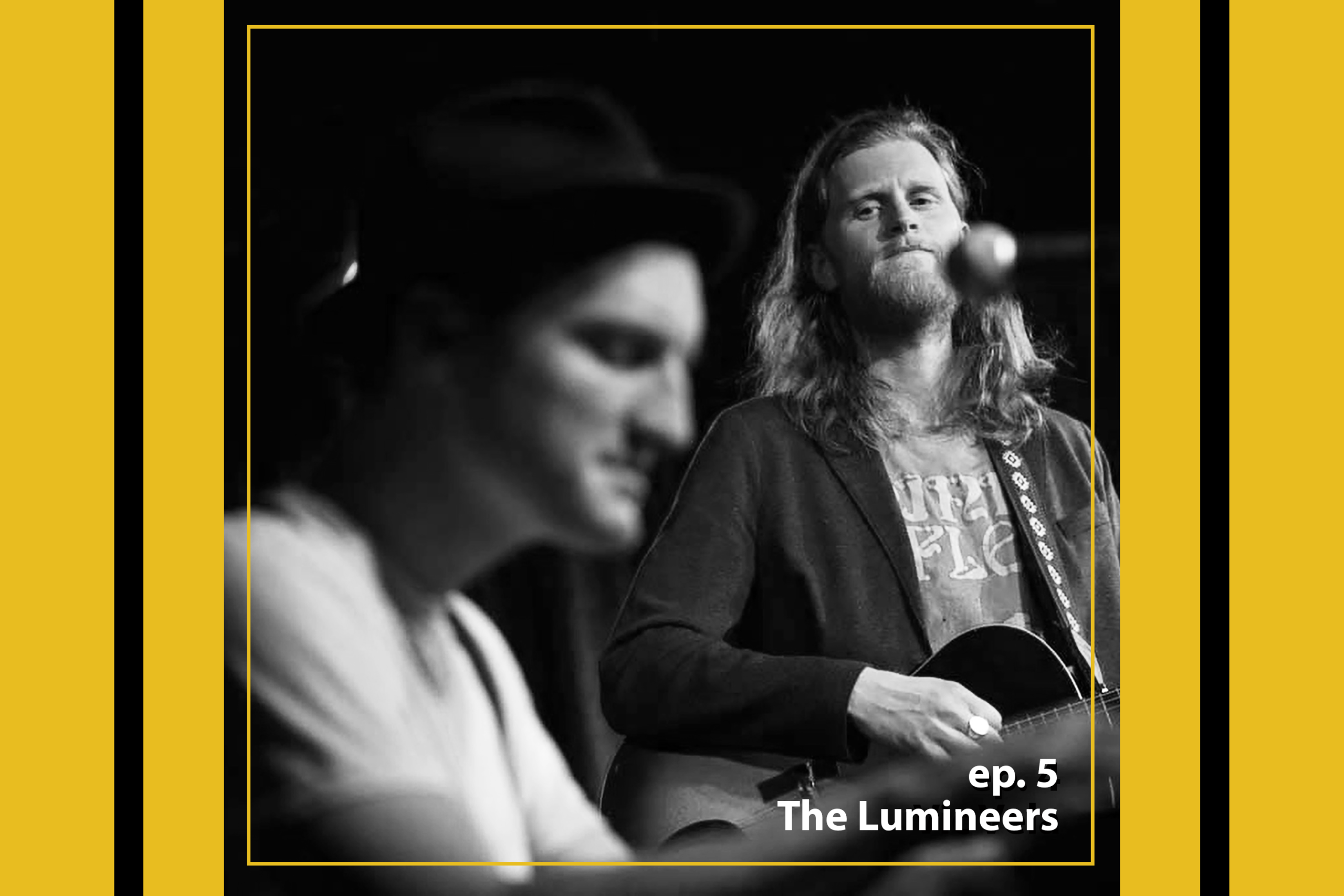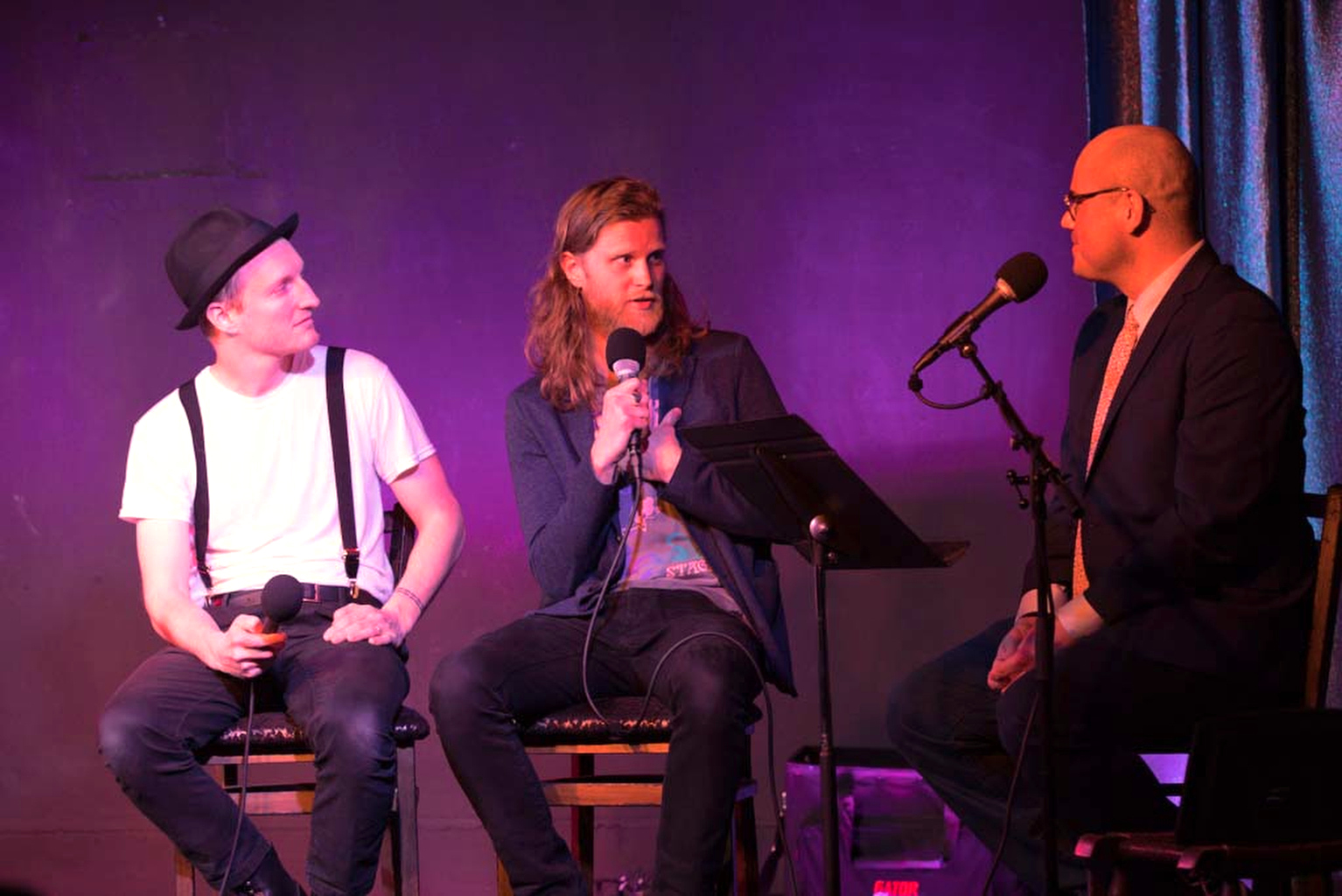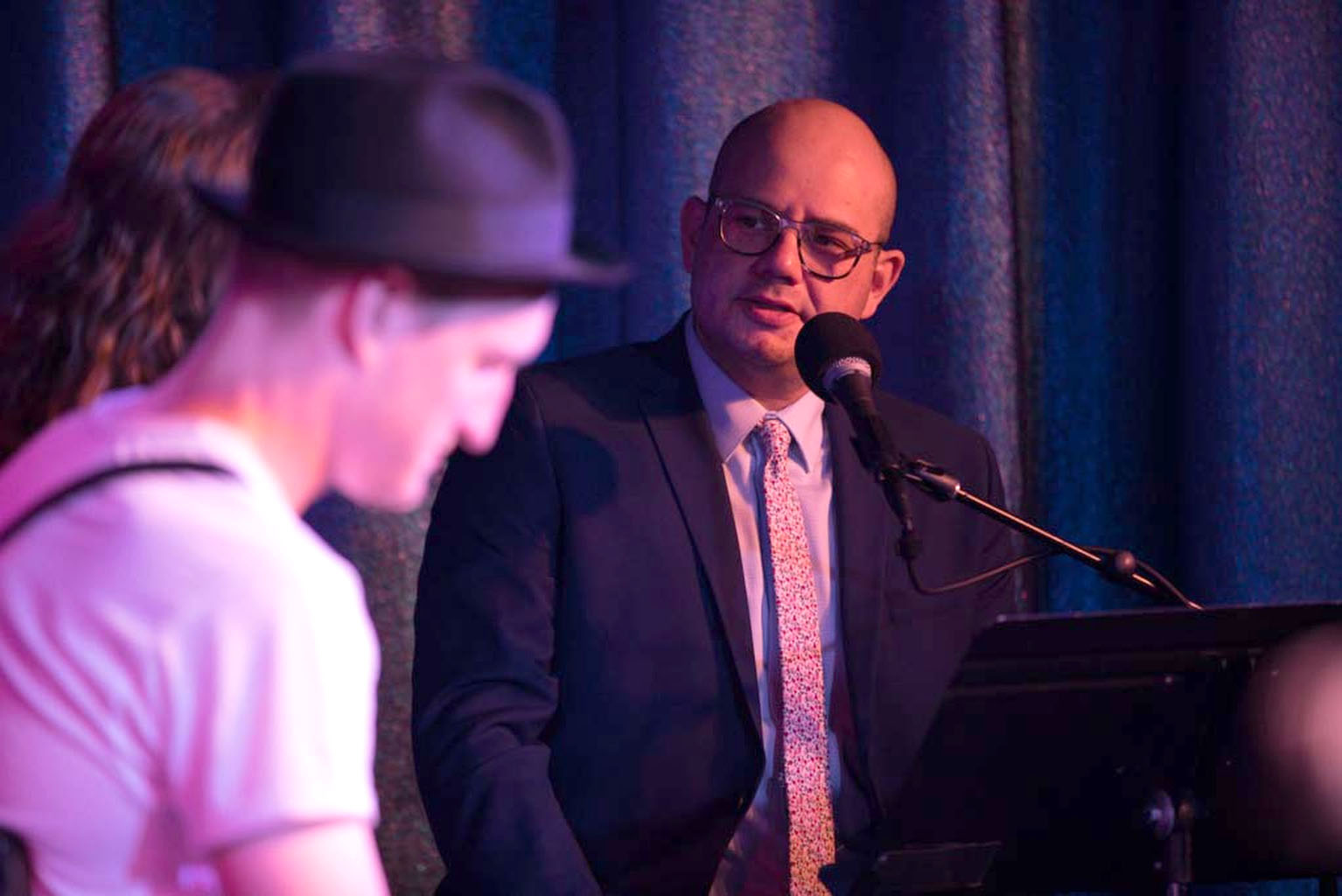
The Lumineers have sold millions of records and played stadiums around the globe. Their latest album is all about the pain of addiction and what it's like to see a loved one struggle with substance abuse. The band members share the personal stories that inspired the music, and play stripped-down versions of three songs, including the hit "Gloria." It's an intimate live episode recorded in front of an audience of people in recovery at the Clocktower Cabaret in Denver.
Transcript:
Vic Vela:
So are you ready?
Audience:
Yeah!
Vic Vela:
Are you ready?
Audience:
Yeah.
Vic Vela:
A little while ago we got to do something pretty amazing. That lively crowd you just heard was actually really small, only about a hundred people. And me and this super excited audience got to hear the Lumineers. A band that's toured the world and played stadiums.
Audience:
(singing)
Vic Vela:
This show was different. The two band mates, Jeremiah Fraites, and Wes Schultz sat down for an interview for this podcast and agreed to play for a small audience of people in recovery, or those connected to it somehow. You see these guys recently made an entire album about how addiction affects generations of a family. The record is called III. So today we've got something a little different for you, an intimate conversation, plus some good music, with the Lumineers. Recorded in Denver, where Wes and Jeremiah live.
Vic Vela:
This is Back From Broken, from Colorado Public Radio, stories about the highest highs, the darkest moments and what it takes to make a comeback… I'm Vic Vela. I'm a journalist, a storyteller, and a recovering drug addict. To kick off this special event, the Lumineers opened the evening with a song about a woman who is struggling with substance use. And the character is based on someone close to Wes Schultz.
Wes Schultz:
So this first song is called Gloria. (Singing).
Vic Vela:
Right on guys.
Jeremiah Fraites:
Thanks a lot.
Wes Schultz:
One song set. Let's do this man.
Vic Vela:
That's got to be hard, right? You're just getting started and you got to sit down and talk.
Wes Schultz:
I'm pumped, yeah. I'm a little pumped up right now. These first few questions are going to be difficult.
Vic Vela:
You guys just played Gloria, which is from the new album. When I first heard this album that you guys put out, I had tremendous emotional response to it as someone who has gone through recovery because I lived so many of those characters, or I could see a lot of my own family members as some of those characters. Gloria is living a troubled life as an alcoholic. Wes let me ask you a few questions first. Who inspired Gloria?
Wes Schultz:
The answer's kind of complicated because I think part of what we set out to do is tell these stories as real, as raw as we could. And, and I think I wanted to keep a level of anonymity with the person I was singing about, but, it's a member of my family that I think as I dove into it, I think one of the goals was to try to write it and if she heard it, she would feel like it was telling the truth, from both sides. I wanted there to be her side of the story too.
Wes Schultz:
So in the song there's a piano that takes over when Jer is like, and that's sort of the other perspective that the song starts out from I think the child's perspective saying to the parent, "Why are you doing this?" And then the piano part is the other side of the story. "Did you know me when I was younger then I could take the whole world with me." I was somebody and I still am and I think that that was the hard part about writing about addiction was not trying to make it like a caricature, but to try to tell stories through scenes instead of trying to sum it all up.
Vic Vela:
Yeah.
Wes Schultz:
It's too big of a subject.
Vic Vela:
Well and also you nailed it. Even addicts at our worst, there is still a part of us that wants to be better. And has those memories of being like, "well," and so hearing that piano against your really strong lyrics is really, it's quite a contrast.
Wes Schultz:
Yeah, and I found the original demo and it was "Heaven help me now, heaven show the way, get me back on my own two feet." There's this eternal hope, almost like when you're drowning, you're always going to try to swim to the surface and get air. It's a part of being human beings, believing and having hope even in the worst of circumstances. Even when some, well, even when your whole family feels hopeless about it. So yeah, it's definitely… It was a high wire act trying to write about it. Just because I knew she might hear it and I wanted her to understand it instead of feel attacked or something like that.
Vic Vela:
Well let's talk about her and we're not going to say precisely which family member this is because of course we want to protect her privacy. But how did your relative's downward spiral begin?
Wes Schultz:
I don't know. I mean that's the great mystery. I just… I think if we knew maybe that would be an easy place to address it. I feel like my introduction to it was that you don't talk about it and you don't mention it and it's a taboo in the family. So that really threw me off because it was so obvious and we were all kind of playing along with the charade.
Vic Vela:
You told me recently, Wes, speaking of love, that the hardest part about dealing with your relatives addiction is that you love her so much. Right? What do you mean by that? Like why is that so hard?
Wes Schultz:
I think that just part of it is that every part of fiber of my body just wanted to stop caring and just say, "Well go do… Go live your life. I don't care. You can't hurt me anymore." But that's… It's almost, what's beautiful about it is like families band together in this way that they don't even sometimes have a choice. It's just what makes, I think addiction, a social disease. It makes it a family event. It's not this thing that's isolated that person.
Vic Vela:
When I was using really hard, the worst thing was when people would tell me that they loved me because the last thing you want to hear when you're closing the blinds and shutting off your phone and, and you're getting high by yourself is that you're hurting someone and that people care about you. That it was hell for me to hear that. But ultimately though, it helped in my recovery and Wes, the lyrics from the song, "Gloria, they found you on the floor. Gloria, my hand was tied to yours," that's the metaphor you're talking about, right? That their addiction is your addiction too.
Wes Schultz:
Yeah, I mean you feel like you're on the roller coaster with them and it leads for me, that for me was a source of, at first, a lot of anger, like resentment. "Why are you bringing me, I didn't sign up for this ride. We're all taking care of ourself. Why can't you take care of your…" It's a very defensive, "Why are you hurting me?" Kind of thing.
Vic Vela:
And to clarify what I said, even though I didn't want to hear that people loved me, thank God I heard that because ultimately that registered. The album follows generations of a family that's really become crippled by drugs and alcohol. Why did you guys want to tell a big story about a whole family to talk about addiction? Why did you choose a family?
Wes Schultz:
Well, I think part of it was there was this mystery about like how does that cycle break if… Can it be unbroken? Is it handed down? Is it social? Is it genetic? What's going on here? I think using generations to see that and explore that. I think was important and it felt like putting this in different bodies was a… Instead of just this one person felt more authentic to I guess, how big it was, how big of a thing it was, and you see a ripple effect in families. And so I think wanting to know if there was a way out, but not really having a resolution. The album doesn't have that and the songs don't really have that. It's more just how do we get out of this and without abandoning someone?
Vic Vela:
Were you guys at all hesitant? You're the Lumineers, you guys are a big deal. Jeremiah, were you at all hesitant to put out this kind of album because it's really heavy stuff. I'm sure a lot of your fans were surprised by it.
Jeremiah Fraites:
Yeah, I think there was a moment of hesitation, but in some sort of abstract way. I think we knew the music was great. It felt like personally, the strongest album that we've ever written together. It being our third Lumineers album, we've been writing together probably 15 years now. Written a ton of songs, a ton of bad ones and I think some good ones. And this album felt like our best album to date, not just because it's our newest album. I think that's the artists' tendency. Your newest stuff you think is the greatest. I actually think this is our best album and some people are like, "This is sad," or "This feels heavy," and it's like well literally any song that is sad or heavy has probably changed your life for better. I don't really know that much. Like sugary saccharin songs. Like Baby Shark, that's not really… That's not going to change your life. Whether it's heartache, addiction, some sort of trauma, tragedy. That's the good stuff in life. It's hard and shitty.
Wes Schultz:
Was a sad song, I'm pretty sure.
Jeremiah Fraites:
Yeah.
Vic Vela:
You guys are going to play Baby Shark tonight, I hope, right? Was this almost like a therapeutic thing for you guys? The making of this album?
Speaker 7:
If the goal of therapy is to feel no closure on the subject?
Speaker 7:
I feel like maybe in some ways, yes. I think it's a very neat way to wrap it up and I've done that where it's kind of like "This is free therapy, I write songs." It's not totally true. I think it's partially just… It's cathartic to scream, it's cathartic to express all of these things. I think mostly it's cathartic to try to tell the truth. I felt so bound and tied up by the idea that we weren't allowed to talk about this among each other or to that person as candidly as maybe it was happening. That really freaked me out and I… part of this album allowed me to say things that I felt very muzzled.
Vic Vela:
Wes, your family member, what's her current situation?
Wes Schultz:
I mean we tried to get her a place and… So she could take care of herself and have her own space and that kind of blew up in our faces and she ended up in jail and then homeless and we're not really sure. We placed a missing persons report and we're not really entirely sure what's going on. And I think that's that ghost that follows you around where you don't even know the next call, what it's going to be about or where it's coming from. And the lack of closure I think is really difficult about the situation too.
Vic Vela:
I want you… Hear you guys play some more music and I think you guys want to hear that too. What are we going to hear?
Wes Schultz:
Well this next song made our album explicit lyrics. So we're going to have to bleep it because it's CPR. So you can imagine the moment, but it's like three F-bombs in the song. I'm just going to be like ghosts. It's called Leader the Landslide. (singing)
Vic Vela:
We're going to take a quick break now. We've heard about Wes's family, but we haven't even talked about the way Jeremiah's life changed forever because of addiction. And of course we'll hear more music, back in just a minute.
Vic Vela:
There's another reason The Lumineers were so motivated to write an album all about addiction that we haven't even talked about yet. When Jeremiah was about 14, he lost his brother, Josh, to a heroin overdose. Josh was older. He was 19, and these guys who are now The Lumineers also grew up together in suburban New Jersey, so Wes also knew Josh. They were actually really good friends. They loved boxing and making art together, and, Jeremiah, he remembers having fun with his big brother, too.
Jeremiah:
I can easily remember the good times like going to the beach and building Legos together, and he played a lot of guitar. He'd played Pink Floyd, AC/DC, Guns N' Roses, and our bedrooms were right next to each other, so that was a huge influence, and I remember I was learning drums at the time, so we jammed together and played Paint it Black by the Stones or he was learning Pink Floyd guitar solos, and it was pretty… I don't know if it was my parents shielding me from it or if my brother was good at hiding it or if it was just one of those things that it was right there in front of my face and I chose not to see it. I don't really remember though a whole lot of… which maybe… which made it worse, the shock when he did die, because I was like, "Oh, it's not. It's not." At that point, that doesn't happen to someone like me. That's not going to happen to him, so I don't really remember a whole lot of those typical scenes of like, oh, he was out all night and we were worried sick. I'm sure my parents could give different stories, different tales, but, yeah, I don't really remember stuff like that, to be honest.
Vic Vela:
What kinds of substances was he using?
Jeremiah:
He was using a lot. I mean, he was caught in high school by this history teacher. He was smoking weed in his car and walked in from the outside field or something. He walked in, and it's… I don't think it was the history teacher's fault obviously, but it spiraled. It splintered to this thing where my brother got sent down to the nurse and then you get suspended for two days or some sort of mandated two-day suspension, and, if I remember correctly, he never went back to Ramsey High School. He went to a different school, a different high school with, for lack of a better description, other troubled teens, other troubled youths.
Jeremiah:
I remember one time in October, about nine months before he died, my mom came into the room and said, "Honey, your brother was arrested last night. He was in a neighboring town in the… like a grocery store parking lot around 2:00 or 3:00 in the morning," and I think he had taken PCP, smoked PCP. I don't even know what you do with that, but I think he had smoked it, and then, supposedly, he went into the supermarket and drank some Drano. He ran out of drugs and thought that was a good idea, and he was in the ICU for about two or three weeks with I think second degree burns on his esophagus, and, at that time, I think I was 13, 14. I didn't really have any gauge of what was going on, and I can actually remember thinking, "He'll get through this. This is a phase. It's a bad case of strep throat or something. He'd get better. You take antibiotics. You get through it, and we'll laugh about this someday."
Jeremiah:
That obviously never happened, but, yeah, I just remember a couple of instances like the ones I just described where I had zero idea of how I would have handled that. Even now, I have a 20-month old son of my own. I don't think there's any age where you'd really be equipped to understand how to deal with that. You would try your best obviously as a parent how to help your son or daughter out with whatever is going on, but, yeah.
Vic Vela:
Ultimately, how did things end with Josh? I know he-
Jeremiah:
Basically, that was in, I think, October of 2000, and then he went into the hospital ICU. He had a lot of anger towards, it seemed like, everybody. I'm sure he was in a really terrible spot, but… and I remember he never came home to our house. My grandmother lived in Pompton Lakes, which was a couple of towns over, and he ultimately went to go live with her, and I guess that was a way to change location, and he was in and out of rehabs, and, yeah, it was around Memorial Day weekend where he was living with my grandmother, and she went to church and I think she called up Josh and thought he was sleeping and, when she came back from church, she went upstairs, and I think she touched his leg or something, and it was like a block of ice, and then she called. I remember she called our house in Ramsey, and I picked up the phone, and I thought… I honestly thought she was dying. She was so hysterical. I thought something was wrong with her, and then she just kept sobbing and saying, "Josh, Josh, Josh," and then…
Vic Vela:
Oh, my God.
Jeremiah:
… I gave the phone to my mom, and, the context of it, just to try to add a little levity, I was playing a computer game with my buddy, Simon, and it was just this absurd… We're playing this game, and it's like, I don't know, a shooter game or something, and my mom is crying at the table, and I'm like, "Dude, I think you got to go." It's just absurd. I'm sure my mom was like, "Simon, you have to go home now." I don't think we really knew. My mom probably knew, and I… the first… They say the first step of what grief is denial, and I remember running upstairs, and I was changing my clothes and I… It's just like, yeah, the most massive amount of denial. This is not happening, and, yeah, we drove over there, and, yeah, the bad news was true so.
Vic Vela:
To what extent did you guys help each other through that time?
Wes:
Four years later, we got together and really started spending time together.
Jeremiah:
When me and Wes started writing, one of the first songs that I think we ever tried to write together was a lyrical song about Josh's passing, and then, ultimately, we wrote songs about Wes' father passing away of cancer or… It was immediately this cathartic. Even though we were also starting out doing covers of… cover band type songs, we started writing originals, and, for me, that was the real high. That was the massive addiction was writing original songs with Wes and trying to sort through all these feelings and just misunderstanding and grief and things like that.
Vic Vela:
You guys had to grow up really fast, and so you guys started at a very young age writing about grief.
Wes:
Yeah, and, oddly, I mean, we lived in a town of 15,000 people, but I knew at least a couple of people that I was friends with that overdosed and passed away in this tiny little town.
Vic Vela:
Jeremiah, I know you don't want to talk too much about yourself. You also had a period where you were partying a little too much for your liking, and I want to congratulate you. You've been sober for how long now?
Jeremiah:
I'll be five years in August, so let's just say four and a half.
Vic Vela:
All right. Yeah, that's great. Why did you decide to get sober?
Jeremiah:
For me, I think it was maybe that old adage, tired of being sick and… what is it? Sick-
Vic Vela:
Sick and tired, yeah.
Jeremiah:
Yeah. I think it just really dawned on me that it was affecting relationships. I think the biggest person that saved my life was my wife. I think that her seeing it before… I think I was going down the road where I would have been eventually maybe closer to a Gloria-like character.
Vic Vela:
Oh, wow.
Jeremiah:
You think you're never going to be like that, but, to be honest, I mean, I don't know, but her seeing that in me early on and really being supportive of that and, thankfully, too, that she doesn't… she's very… She'll have half a glass of wine and be done, and I'm like, "I don't get that." I could have six glasses of wine and be like, "Now, we've started," and I'm not necessarily proud of that. That's just the reality of…
Vic Vela:
That's the truth. That's the truth.
Jeremiah:
… my genetic makeup. I have told people at times it was like eating a cheeseburger and being like, "I can't wait to have another cheeseburger." You are already eating a cheeseburger, and that's how it felt sometimes with drinking, and our lifestyle, too, unfortunately, I think just naturally enables it.
Jeremiah:
It's funny, if you were to say like, "Give me three shots of tequila," people would be like, "Yeah," and if you're like, "Can I have water?" they're like, "Are you okay? Are you sick? Is everything all right?" It's these things that I've noticed along the way of sobriety where it's like, literally, sometimes on a long international flight, it's easier to get wine and water, and I'm like, "Where's the water lady? Where's the water person?" and I think that it was… I think I realized it about two years before I became sober that I wanted that. It was like I was not waiting for something to happen, but I think I knew subconsciously this is not fun anymore. This is not improving my life. It's taken away from it in some way, but you buy into that feedback loop, and I think, for me, the biggest fear I had was somehow I'm not going to become creative. That's my career. That's our livelihood. That's the biggest thing in my life. One of the biggest things in my life is supposedly being creative, and I'm like, "You lose the drugs. You lose the alcohol."
Jeremiah:
I remember playing the first probably 40, 50 shows with The Lumineers. It was a really terrifying experience because now you're on stage, you're vulnerable, whereas you used to be able to get to maybe a state of oblivion where you're just… You're just up there and you're like, "I'm one with the music," and you're free. Now, I can get to that place sober, but it took many shows of being like, "Oh, this is tough. There's a lot of people out there, and this is a nerve wracking experience," and… but it's true. I mean, I had a couple people in my life say, "You will become more creative. You will feel closer to music. I know you don't see that now, but promise me you will," and I was like, "I definitely don't believe you. There's no way that's going to happen."
Vic Vela:
You just had to experience it yourself. I mean, when I started my career in television as a sports anchor, I could not go on the air, or I thought I couldn't go on the air, without a shot and a line. That just was total normal behavior. That's just what I do, and when I'm like, "How can I get sober? How can I write sober? How can I tell a good story sober?" and the truth is is that you're a better storyteller because you're not clouded by drugs and alcohol. The best thing about it is I don't miss it, and you find that you don't really need it.
Jeremiah:
Yeah, that's true. It's been interesting though. For me, I almost never use the word sober. I probably am using it more because I know the room I'm in right now. I don't have a problem with saying I'm sober. I just think that society has made that word a bad word a little bit. I think, personally, I tend to say I've refrained from alcohol or I will still white lie to people and say I've never really drank. I don't drink because I don't want to get into a therapy session with some random person after a gig and whatever. That's going to be a heavy 15 minutes potentially to… If I'm into it, I'll get into it, but, if I'm not, I don't want to inadvertently get into a heavy conversation about that, but I do think that society has made that word a weird stigma where, "Oh, you're sober? That means you were a bad person before." It's like, no, I was… you're a sick person or you have… You had these tendencies or you did these things that can sometimes be deemed as being bad.
Vic Vela:
Sometimes, it's just easier not to have to explain yourself, but I think the more people talk about this stuff, the less we have to explain ourselves when we say no to a drink.
Jeremiah:
Even in New Jersey where we're from, yeah, there's so many friends of friends or actual friends, or family members in my case, who have died or been close to dying from prescription drug abuse or the street drug, heroin or crack or whatever, and I still know people in my life that are even functional addicts or alcoholics, and I don't know if they know that, but I'm like, "You are." I mean, I see that.
Vic Vela:
Yeah. I mean, you guys have been terrific. I really, really, really appreciate you guys talking about this stuff tonight. Thank you.
Wes:
Yeah, thanks for having us. Yeah.
Vic Vela:
Just a quick note about this last song from The Lumineers album, III, it's another snapshot of addiction. The lyrics are heart-wrenching. Here's the song called Donna, The Lumineers playing to an audience of people in recovery. (singing)
Speaker 3:
The Lumineers. Ladies and gentlemen, The Lumineers. Thank you all for coming.
Vic Vela:
Thanks again to The Lumineers for an uplifting show. They finished the night with a great encore, a song Wes calls cathartic. He and Jeremiah invited the audience to stand up and sing along to Stubborn Love.
Jeremiah:
Thank you, guys, for being here tonight. This has been really special for us. I hope you guys had a good time. (singing)
Vic Vela:
Back from Broken is a production of Colorado Public Radio's Audio Innovation Studio and CPR News. Thanks to people in recovery who helped us develop this podcast. Ben, Matthew, Sean and Mateo, thank you so much for your guidance.
Vic Vela:
If you knows someone who might benefit from stories like this, please share this podcast with them. We spent more than a year building this show on research, interviews, production and editing because we know it'll help people, but it does cost money. People who listen to this podcast, people just like you, make it a reality. If you can, please contribute to the making of future episode at backfrombroken.org.
Jeremiah:
People don't always get what you're singing about. Ho Hey was about a breakup, and people get married to that song.
Wes:
Yeah. Yeah, it's a big wedding song, yeah.
Jeremiah:
That's right.
Wes:
That's fine. I'll take it, yeah. Yeah, it's great, but-
Jeremiah:
Or even Gloria. I had a four-year-old singing Gloria to me on a ukulele, and she's like (singing), and I'm like, "Whoa," and it was like a horror movie, but also really cute.
Vic Vela:
You can see photos of this special live episode and The Lumineers performing at backfrombroken.org. The Back from Broken team is Rachel Estabrook, Brad Turner, Kevin Dale, Rebecca Romberg and Daniel Mescher, and a lot of other folks made this episode possible. Thanks go out to Francie Swidler, Kim Nguyen, Hart Van Denburg, Kevin Beatty, Kendall Smith, Jody Girsch, Doug Clifton, Matt Herz, Peter Creamer, Irvin Coffee, Corey Jones, and The Clocktower Cabaret in Denver for hosting our event.
Vic Vela:
Please subscribe, rate and review the show on Apple Podcasts. It really helps other people find it. I'm Vic Vela. Thanks for listening to Back from Broken. (singing)














